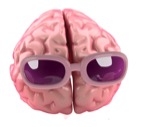
“How do you do that?” my ADHD client, Brianna, asked her husband one evening. “How do you make it look so easy, Dan?”
It sounds simple but, without fail as soon as dinner ended every night, Dan immediately put the dishes in the sink and began cleaning the kitchen.
“Make what look easy?” Dan asked, confused.
“That!” Brianna pointed. “As soon as dinner ends, you just start cleaning up! I don’t understand how you do it. I can’t go straight from dinner to dishes.” Dan was bewildered. To him, moving from eating dinner to cleaning dishes was natural. But to Brianna, it felt like Dan was blessed with a superpower.

Managing the perilous moment of moving from one task to the next without getting lost or distracted.
If you have ADHD, you understand how hard transitions can be—especially when you are hyper-focused on something. Transitions for ADHDers are a multi-step process:
First, you have to stop your current activity. That in itself is like stopping a freight train—it takes a huge effort.
Then, in a semi-dazed state, you need to figure out what comes next. Or maybe you know what comes next. Maybe you dread what comes next. Or perhaps you love what comes next.
It doesn’t matter. Starting that next thing can feel like pushing a stopped freight train.
Why are transitions so hard for people with ADHD? Why can’t everyone just be like Dan and glide effortlessly from one activity to the next?
You vs. Your ADHD Brain
Transitions require self-control and self-regulation—neither of which are ADHD strengths. When ADHDers know they need to move to something new, the conversation goes something like:

You: Hey! Brain! It’s time to move on.
ADHD Brain: Are you kidding? I am just getting comfortable.
You: I know. But we have to do this other thing.
ADHD Brain: Do you have any idea how hard that is?
You: Yes. But other peoples’ brains do it all the time. What’s your problem?
ADHD Brain: It takes a lot of energy for me to switch. What you are asking is really, really difficult.
You (having not heard a single word): It should be easy. Others can do it. I guess I must be lazy, bad, incompetent…
This brain speaks the truth. Recognizing that transitions are difficult for the ADHD brain is the key to overcoming stumbling blocks.

Two Kinds of Transitions
There are Transitions and there are transitions.
Transitions (big T!) are major life changes: a new job, a different living situation, marriage, or divorce. The list is long but these Transitions tend to be few and far between.
Many ADHDers actually enjoy Transitions. The novelty of big Transitions is exciting! ADHD brains light up! A new school, new job, new spouse, new house—these are things many ADHDers find exciting and fun. On the flip side, it’s important to note that big Transitions are not welcomed by everyone with ADHD. Some find Transitions detrimental to their hard-learned coping skills.
Lowercase-t transitions make up a bigger—and harder-to-tackle—list: things as simple as being interrupted by a phone call, moving from one room to another, getting ready for bed, or starting a new task. The examples are endless. These transitions are dealt with every single day, many times a day. No wonder ADHDers like Brianna are exhausted—and exasperated!—by the end of the day.
What Can You Do?
In a burst of inspiration one day, a different ADHD client of mine declared, “Transitions are to-dos in themselves!”
Bingo! Brilliant! This is SO true and her inspiration was absolutely correct. Transitioning from one task to another takes:
- Awareness that it is not easy.
- Respect for the effort and energy it takes the ADHD brain to transition.
- Patience in allowing the transition to take place.
- Projecting “a movie in the mind” about what the next activity looks like.
- Thinking how it will feel when the next task is complete.
Light Dawns!
When Brianna and I discussed the need to consider a transition as its own “to-do” a light bulb went off in her head. She’d never considered it that way but began to respect the effort that even small transitions take.
She acknowledges now that transitioning from task to task, even something as seemingly simple as finishing dinner and starting the dishes, is—for her ADHD brain—a step in its own right. Where her husband can stop eating and immediately start cleaning, Brianna’s brain requires the intermediate step of transitioning between the two events.
Even small transitions take time, energy, and planning.
And that’s okay.
About Linda King

Linda King is a former educator, former parenting instructor (Systematic Training for Effective Parenting), and current ADHD coach with nearly a decade of ADHD coaching experience. She has completed over 350 hours of ADHD coach training, including family-specific training. Linda holds advanced certifications in both ADHD coaching and life coaching. Her practice, The Joy of Getting Things Done, is based near Boston, Massachusetts.




This step is by far the hardest for me:
“Projecting “a movie in the mind” about what the next activity looks like.”
Given past events, and ADHD especially unexpected and unusual results,’ over 50+ years, there is no longer any confidence in the supposedly “predicting movie” in my head regarding the future. It’s the combining and meshing of the next (new or even routine) event or activity and the people I know and the people I don’t and their AND MY expectations, motivations and my EVER often CHANGING expectations, current thoughts and difficulty in focusing the current and future actions and words separately and organizing them in a way that others and as a result sometimes even I can understand, or accept as real or probable.